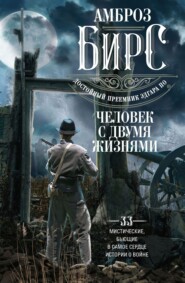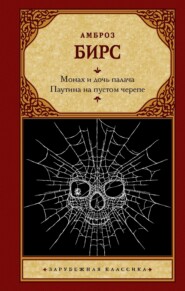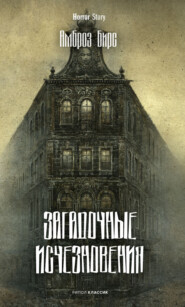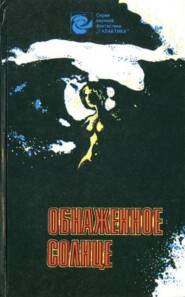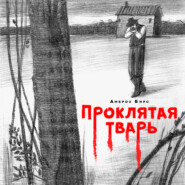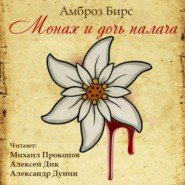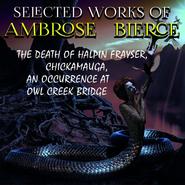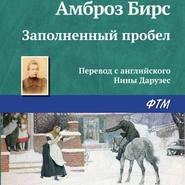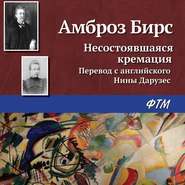По всем вопросам обращайтесь на: info@litportal.ru
(©) 2003-2024.
✖
The Cynic's Word Book
Настройки чтения
Размер шрифта
Высота строк
Поля
Like clods on the coffin's empty shell:
"Ho, ho! A beggar on horseback, they say,
Will ride to the devil!" – and thump
Fell the flat of his dart on the rump
Of the charger, which galloped away.
Faster and faster and faster it flew,
Till the rocks, and the flocks, and the trees that
grew
By the road, were dim, and blended, and blue
To the wild, wide eyes
Of the rider – in size
Resembling a couple of blackberry pies.
Death laughed again, as a tomb might laugh
At a burial service spoiled,
And the mourners' intentions foiled
By the body erecting
Its head and objecting
To further proceedings in its behalf.
Many a year and many a day
Have passed since these events away.
The monk has long been a dusty corse,
And Death has never recovered his horse.
For the friar got hold of its tail,
And steered it within the pale
Of the monastery gray,
Where the beast was stabled and fed,
With barley, and oil, and bread,
Till fatter it grew than the fattest friar,
And so in due course was appointed Prior.
G.J.
CARNIVOROUS, adj. Addicted to the cruelty of devouring the timorous vegetarian, his heirs and assigns.
CARTESIAN, adj. Relating to Descartes, a famous philosopher, author of the celebrated dictum, Cogito, ergo sum– whereby he was pleased to suppose he demonstrated the reality of human existence. The dictum might be improved, however, thus: Cogito cogito, ergo cogito sum– "I think that I think, therefore I think that I am;" as close an approach to certainty as any philosopher has yet made.
CAT, n. A soft, indestructible automaton provided by nature to be kicked when things go wrong in the domestic circle.
This is a dog,
This is a cat,
This is a frog,
This is a rat.
Run, dog, mew, cat,
Jump, frog, gnaw, rat.
Elevenson.
CAVILER, n. A critic of one's own work.
CEMETERY, n. An isolated suburban spot where mourners match lies, poets write at a target and stonecutters spell for a wager. The inscriptions following will serve to illustrate the success attained in these Olympian games:
"His virtues were so conspicuous that his enemies, unable to overlook them, denied them, and his friends, to whose loose lives they were a rebuke, represented them as vices. They are here commemorated by his family, who shared them."
"In the earth we here prepare a
Place to lay our little Clara.
– Thomas M. and Mary Frazer.
P. S. – Gabriel will raise her."
CENTAUR, n. One of a race of persons who lived before the division of labor had been carried to such a pitch of differentiation, and who followed the primitive economic maxim, "Every man his own horse." The best of the lot was Chiron, who to the wisdom and virtues of the horse added the fleetness of man. The scripture story of the head of John the Baptist on a charger shows that pagan myths have somewhat sophisticated sacred history.
CERBERUS, n. The watch-dog of Hades, whose duty it was to guard the entrance – against whom or what does not clearly appear. Everybody, sooner or later, had to go there, and nobody wanted to carry off the entrance. Cerberus is known to have had three heads, and some of the poets have credited him with as many as a hundred. Professor Graybill, whose clerkly erudition and profound knowledge of Greek give his opinion great weight, has averaged all the estimates, and makes the number twenty-seven – a judgment that would be entirely conclusive if Professor Graybill had known (a) something about dogs, and (b) something about arithmetic.
CHILDHOOD, n. The period of human life intermediate between the idiocy of infancy and the folly of youth – two removes from the sin of manhood and three from the remorse of age.
CHRISTIAN, n. One who believes that the New Testament is a divinely inspired book admirably suited to the spiritual needs of his neighbor. One who follows the teachings of Christ in so far as they are not inconsistent with a life of sin.
I dreamed I stood upon a hill, and, lo!
The godly multitudes walked to and fro
Beneath, in Sabbath garments fitly clad,
With pious mien, appropriately sad,
While all the church bells made a solemn din
A fire-alarm to those who lived in sin.
Then saw I gazing thoughtfully below,
With tranquil face, upon that holy show
A tall, spare figure in a robe of white,
Whose eyes diffused a melancholy light.
"God keep you, stranger," I exclaimed. "You are
No doubt (your habit shows it) from afar;
And yet I entertain the hope that you,
Like these good people, are a Christian too."
He raised his eyes and with a look so stern
It made me with a thousand blushes burn
Replied – his manner with disdain was spiced:
"What! I a Christian? No, indeed! I 'm Christ."
G.J.
CIRCUS, n. A place where horses, ponies, and elephants are permitted to see men, women, and children acting the fool.
CLAIRVOYANT, n. A person, commonly a woman, who has the power of seeing that which is invisible to her patron – namely, that he is a blockhead.
CLARIONET, n. An instrument of torture operated by a person with cotton in his ears. There are two instruments that are worse than a clarionet – two clarionets.
CLERGYMAN, n. A man who undertakes the management of our spiritual affairs as a method of bettering his temporal ones.
CLIO, n. One of the nine Muses. Clio's function was to preside over history – which she did with great dignity, many of the prominent citizens of Athens occupying seats on the platform, the meetings being addressed by Messrs. Xenophon, Herodotus and other popular speakers.
"Ho, ho! A beggar on horseback, they say,
Will ride to the devil!" – and thump
Fell the flat of his dart on the rump
Of the charger, which galloped away.
Faster and faster and faster it flew,
Till the rocks, and the flocks, and the trees that
grew
By the road, were dim, and blended, and blue
To the wild, wide eyes
Of the rider – in size
Resembling a couple of blackberry pies.
Death laughed again, as a tomb might laugh
At a burial service spoiled,
And the mourners' intentions foiled
By the body erecting
Its head and objecting
To further proceedings in its behalf.
Many a year and many a day
Have passed since these events away.
The monk has long been a dusty corse,
And Death has never recovered his horse.
For the friar got hold of its tail,
And steered it within the pale
Of the monastery gray,
Where the beast was stabled and fed,
With barley, and oil, and bread,
Till fatter it grew than the fattest friar,
And so in due course was appointed Prior.
G.J.
CARNIVOROUS, adj. Addicted to the cruelty of devouring the timorous vegetarian, his heirs and assigns.
CARTESIAN, adj. Relating to Descartes, a famous philosopher, author of the celebrated dictum, Cogito, ergo sum– whereby he was pleased to suppose he demonstrated the reality of human existence. The dictum might be improved, however, thus: Cogito cogito, ergo cogito sum– "I think that I think, therefore I think that I am;" as close an approach to certainty as any philosopher has yet made.
CAT, n. A soft, indestructible automaton provided by nature to be kicked when things go wrong in the domestic circle.
This is a dog,
This is a cat,
This is a frog,
This is a rat.
Run, dog, mew, cat,
Jump, frog, gnaw, rat.
Elevenson.
CAVILER, n. A critic of one's own work.
CEMETERY, n. An isolated suburban spot where mourners match lies, poets write at a target and stonecutters spell for a wager. The inscriptions following will serve to illustrate the success attained in these Olympian games:
"His virtues were so conspicuous that his enemies, unable to overlook them, denied them, and his friends, to whose loose lives they were a rebuke, represented them as vices. They are here commemorated by his family, who shared them."
"In the earth we here prepare a
Place to lay our little Clara.
– Thomas M. and Mary Frazer.
P. S. – Gabriel will raise her."
CENTAUR, n. One of a race of persons who lived before the division of labor had been carried to such a pitch of differentiation, and who followed the primitive economic maxim, "Every man his own horse." The best of the lot was Chiron, who to the wisdom and virtues of the horse added the fleetness of man. The scripture story of the head of John the Baptist on a charger shows that pagan myths have somewhat sophisticated sacred history.
CERBERUS, n. The watch-dog of Hades, whose duty it was to guard the entrance – against whom or what does not clearly appear. Everybody, sooner or later, had to go there, and nobody wanted to carry off the entrance. Cerberus is known to have had three heads, and some of the poets have credited him with as many as a hundred. Professor Graybill, whose clerkly erudition and profound knowledge of Greek give his opinion great weight, has averaged all the estimates, and makes the number twenty-seven – a judgment that would be entirely conclusive if Professor Graybill had known (a) something about dogs, and (b) something about arithmetic.
CHILDHOOD, n. The period of human life intermediate between the idiocy of infancy and the folly of youth – two removes from the sin of manhood and three from the remorse of age.
CHRISTIAN, n. One who believes that the New Testament is a divinely inspired book admirably suited to the spiritual needs of his neighbor. One who follows the teachings of Christ in so far as they are not inconsistent with a life of sin.
I dreamed I stood upon a hill, and, lo!
The godly multitudes walked to and fro
Beneath, in Sabbath garments fitly clad,
With pious mien, appropriately sad,
While all the church bells made a solemn din
A fire-alarm to those who lived in sin.
Then saw I gazing thoughtfully below,
With tranquil face, upon that holy show
A tall, spare figure in a robe of white,
Whose eyes diffused a melancholy light.
"God keep you, stranger," I exclaimed. "You are
No doubt (your habit shows it) from afar;
And yet I entertain the hope that you,
Like these good people, are a Christian too."
He raised his eyes and with a look so stern
It made me with a thousand blushes burn
Replied – his manner with disdain was spiced:
"What! I a Christian? No, indeed! I 'm Christ."
G.J.
CIRCUS, n. A place where horses, ponies, and elephants are permitted to see men, women, and children acting the fool.
CLAIRVOYANT, n. A person, commonly a woman, who has the power of seeing that which is invisible to her patron – namely, that he is a blockhead.
CLARIONET, n. An instrument of torture operated by a person with cotton in his ears. There are two instruments that are worse than a clarionet – two clarionets.
CLERGYMAN, n. A man who undertakes the management of our spiritual affairs as a method of bettering his temporal ones.
CLIO, n. One of the nine Muses. Clio's function was to preside over history – which she did with great dignity, many of the prominent citizens of Athens occupying seats on the platform, the meetings being addressed by Messrs. Xenophon, Herodotus and other popular speakers.






